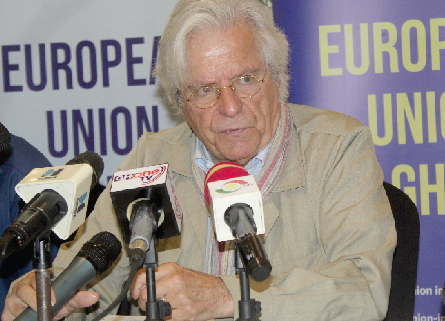A European Union (EU) election observation team has expressed concern over unaddressed reforms recommended following its election observation mission in Ghana in 2020.
Among the recommendation were the need for legal reforms on issues such as political financing, including the misuse of state resources; the increased participation of women in political life; a more inclusive process for nomination of electoral commissioners; and the management of petitions for parliamentary elections.
The recommendations also highlighted the need to provide for appropriate oversight of media and digital communications during the campaigning period.
"The failure to address some of these issues, which also featured in the EOM (election observation mission) report of 2016 and the election expert mission of 2012, is a missed opportunity for Ghana,” said the Chief of Mission, Javier Nart, who is also a Member of the European Parliament and Chief Observer of the EU Election Observation Mission to Ghana in 2020.
After a follow-up mission to Ghana between March 20 and 24, 2023, the team expressed worry that only six out of 18 recommendations made after its observation before and during the 2020 presidential and parliamentary elections in Ghana "were partially being addressed by the Electoral Commission (EC)", while there "was a lack of political will to implement the reforms recommended".
Briefing journalists in Accra yesterday, Mr Nart said the follow-up mission was not a "political one but an independent technical mission aimed at promoting discussion and action by key national stakeholders working towards strengthening democracy in Ghana”.
He said the mission was also to raise awareness of areas where electoral reforms had remained unaddressed, and was also to assess the status of the implementation of recommendations offered by the 2020 EU election observation mission.
He said the team met numerous electoral stakeholders, including the EC, Parliament, relevant state institutions, the judiciary, political parties, media institutions, civil society and development partners, during the visit.
The implementation of the recommendations, Mr Nart stated, would ensure transparency and inclusivity in the management of the electoral process, which, he said, was critical to enhance public confidence.
He said the team had observed in its follow-up visit that a number of issues requiring legal change remained outstanding, highlighting a lack of political will in particular from the political parties to take the necessary legal reforms.
Follow-up mission
"The follow-up mission could not help but notice that EU recommendations have received no attention from the main political parties, including within Parliament, although the report was shared extensively with their leaderships,” he said.
He said with 18 months more to Ghana’s next elections, “the EU continues to support and work together with Ghanaian stakeholders, striving to strengthen democracy, and — as there is still time before the elections — we believe that the implementation of recommendations can contribute to further enhance transparency, inclusiveness and credibility of elections in Ghana”.
“The recommendations by an EU election observation mission are an integral part of its work. When recommendations go unnoticed and unaddressed for multiple electoral cycles, it puts into question the value of the observation effort and the valuable work of citizen observers,” he stressed.
Encouraging development
An election expert and a member of the EU elections follow-up mission, Mark Stevens, said during the follow-up visit, it was found that in terms of technical reforms, the EC had indicated that it was working on addressing six of the suggestions of the EU election observation mission.
He said some of the measures being addressed to enhance transparency in the EC’s procedures and results management would include timely publication of polling station results and polling station procedures.
He said plans by the EC to provide more time for candidate nominations and enhance management of financial reporting by parties were also welcomed by the EU elections follow-up mission.
In terms of ensuring a conducive environment for future elections, the team said it was also imperative for the EC and political parties to have a collaborative and inclusive approach to facilitate constructive discussions and help to mitigate potential tensions during the run-up to the polls.

